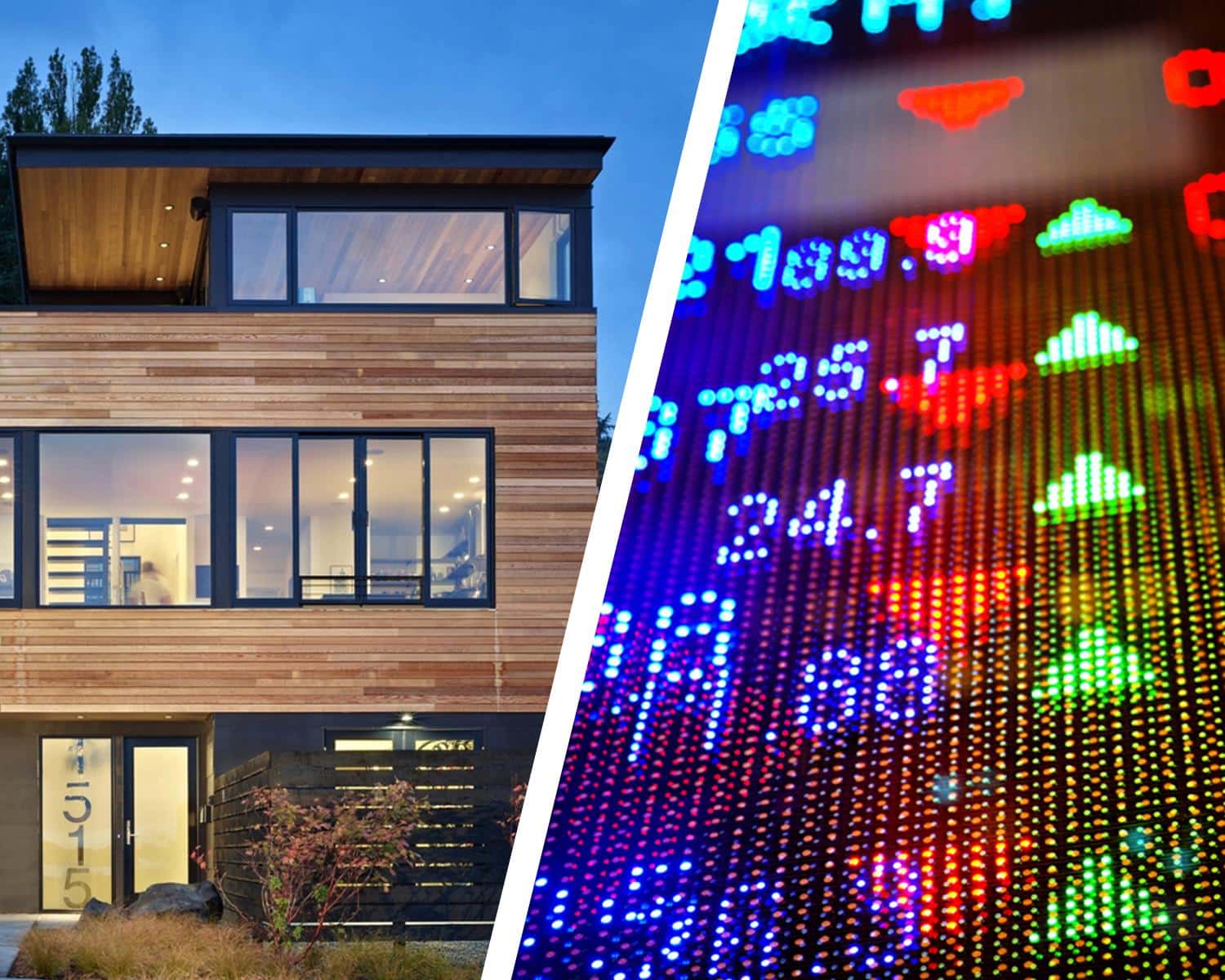Once you’re in a stable financial position, investing becomes an option. You have several choices available. Here’s a comparison of buying an investment property and investing in stocks.
As you get older, you start looking towards the future. Not so much yours, though having enough money for a stable retirement is very important. Instead, you may look into ways to create a nest egg that your children can benefit from.For many, this leads them down the road of investing. Making investments carries a certain amount of risk. There’s always the possibility that things could go wrong and you’ll lose a lot of money. However, if you get it right you can set yourself and your family up for a comfortable financial future.For many, investment boils down to a simple choice: property vs. stocks.Buying an investment property presents a more stable option. However, investing in stocks promises faster returns.But is it really that simple?Each method has benefits and drawbacks. Let’s cover them here so you can decide if buying an investment property is the right choice for you.
Buying an Investment Property
Investing in property appears to be the simpler of the two options. You buy a property, then you profit from either selling it on or renting it out.That leads to a key question. Should I invest for growth or yield when buying property?It depends on what you want from the investment. Buying for growth means that you may not make as much money during the course of ownership. However, with the right timing and improvements, you earn a large lump sum upon selling. This is the tactic that house flippers use regularly. They buy a property for less than its potential value. Then, they renovate. Once it’s in a better condition, they sell it to make a profit.Investing for yield means that you invest with the aim of renting the property out. This results in an ongoing, regular income. However, you also have to deal directly with tenant concerns. Constant maintenance can also eat into those monthly profits.The choice is yours. Now, let’s look at some more general pros and cons of buying an investment property.
The Pros
Why is property a great investment?These benefits set it apart from investing in stocks.
Pro #1 – Less Volatile
If you’re a novice investor, you don’t want to end up in a position where you may lose all of your money. Property is an excellent choice for novices because it offers less volatility.As a general rule, most properties increase in value as time goes on. Inflation takes care of that. Of course, any changes that you make will also affect the property’s value. However, you always have the option of selling and making at least some of your money back. Usually, your property will generate a profit.Furthermore, the property market does change. However, it does so at a far slower rate than the stock market. You generally have time to react to most property market changes. As a result, buying an investment property means facing less volatility.Finally, buying an investment property is a long-term investment option. You won’t make a profit overnight. However, you can generate income on a regular basis, with a lump sum at the end when you sell. This gives you a stable cashflow.
Pro #2 – You Get More With Less
Let’s say that you have $50,000 to spend. With most other investment types, you plug that money into something and hope that it generates a return.However, you get more than that $50,000 when buying an investment property.Confused? Here’s how it works.You’ll speak to lenders to get a mortgage for your property. That $50,000 may give you access to a home loan with a value of up to $500,000.This benefit comes to the fore when you experience growth. With this example, a 10% return on stocks generates $5,000. When buying an investment property, it generates $50,000.Furthermore, this also means there’s a low barrier to entry. You can secure a larger investment with less money when buying an investment property.
Pro #3 – You Have More Control
Control is key when it comes to investments. When buying an investment property, you have more control.Yes, external market factors can affect you. Crime rates and the economy could damage the investment.However, you have control over what happens to the property. You’re the one who approves improvements and manages the investment. The changes that you make have a direct impact on the state of the investment.That’s a level of control that you don’t get with stocks.
The Cons
Buying an investment property doesn’t guarantee that you’ll make money. In fact, there are several cons to consider before investing.
Con #1 – No Short-Term Exits
Property is not a liquid investment. What this means is that you often can’t complete a quick sale. It can take months to find a suitable buyer, especially in more competitive property markets.This usually won’t affect you. But imagine that you’re in an emergency situation and you need quick access to your money. You tie up that money when buying an investment property, making it difficult to access. Even a remortgage to access the equity takes several weeks to arrange.
Con #2 – Insurance and Tax Spikes
While you have control over rents and what you do with the property, you don’t control the government. Furthermore, you have no control over what insurance companies do.A poorly-timed tax increase could eat into your profits. In some cases, such increases could catch you so off-guard that you can’t adjust rents in time to meet them.As for insurance, you must always account for natural disasters. Flooding, hurricanes, and other natural disasters result in larger premiums. Again, your rents may not always cover the increases.
Con #3 – Bad Tenants
No matter what you do with the property, you can’t account for bad tenants. Proper screening lowers the risk, but bad tenants can still slip through the cracks.How do bad tenants affect you? For one, they may refuse to pay their rent on time, which causes cashflow issues. They can also cause damage to the property that far exceeds the depreciation you can claim on your assets.Having bad tenants also means you have to carry out evictions. This leaves the property vacant, so it can’t generate an income. You then have to spend more money on attracting new tenants.A couple of bad tenants in a row can cause serious damage to your monthly yield.
Investing in Stocks
So, that’s the good and bad of buying an investment property. But what about stocks?Stocks involve investing your equity to take part-ownership of a company. In return, you’ll receive a portion of the company’s earnings based on the amount of stock you own.Much like with property investment, you have two options when it comes to stocks. You can buy common stocks, which gives you some voting rights in the company. However, you don’t receive any dividends.Preferred stocks reverse that setup.The previous section of the article alluded to some pros and cons of stocks. Here they are in more detail.
The Pros
Investing in stocks usually means that you’re playing directly against the economy.However, you also have to consider the fortunes of the company that you invest in. These are some of the pros.
Pro #1 – Growing Economies
Stocks offer their biggest returns when the economy grows. Generally, a growing economy means more success for the businesses within that economy. This means that people receive larger paychecks for their work and more people are in work. These people then pump their money back into the economy.If you make the right choices, these growth periods can lead to massive returns. Investing in a well-placed company means you take advantage of the growing economy. As the company enjoys a boom period, your investment generates greater returns.
Pro #2 – Easy Transactions
Property may be the easier investment to understand. However, it’s not the easiest to get involved in. You have to deal with all of the loan applications and paperwork involved in a property transaction.The purchasing process with stocks is much easier. You can buy stocks yourself online or use the services of a broker. Whatever choice you make, all it involves is having an account on the stock market. You can then buy and sell stocks in a matter of minutes. This also means that you can make money faster with stocks than when buying an investment property.
The Cons
Unfortunately, the fast-moving nature of stocks presents some downsides. There are also issues that are beyond your control.These are the cons of stock ownership.
Con #1 – You Rely on the Company
Property offers you control. Investing in stocks does not. You’re relying on the company that you invest in to make the right moves and adapt to evolving markets. If it doesn’t, your investment suffers.If the stock price falls below your purchase price, you lose money when you sell. If you’re a common stockholder, you’re also the last to receive money if the company goes bust. In some cases, you may get nothing at all.
Con #2 – It Takes More Time Than You Think
Buying stocks may be easy. However, researching them isn’t. You’ll spend a long time deciding which stocks to invest in. There’s also the added pressure of knowing that a wrong choice means you can lose money quickly.You can mitigate some of these efforts if you hire an advisor. However, that eats into your profit margin. If you go it alone, you’re going to spend a lot of time looking at facts and figures. If you can’t identify market trends, you’ll struggle to make money.
Con #3 – A Fast Market
When buying an investment property, you have time to react to market changes. With stocks, the market may change in a matter of seconds. If you’re not alert to these changes, you could lose a lot of money.Several things could change the course of your investment. A bad public relations incident could drop the stock price of a company. A leading shareholder selling their stocks could have a snowball effect. There are so many variables to consider and you can’t afford to not pay attention.
The Final Word
The investment that works best for you depends on your circumstances. The stock market offers you the chance to make money quickly. You can make transactions in minutes and take advantage of growing economies. However, you have less control. Changing market conditions could result in you losing money. Worse yet, these changes may happen so fast that you can’t react to them.Buying an investment property offers more stability. The property market moves slower than the stock market. As a result, you can react to issues and have more time to make decisions. You also receive regular income and have more control over the investment. Unfortunately, property can cause issues if you need fast access to your money. Furthermore, a few bad tenants can seriously damage yields and cashflow.Weigh up the pros and cons of each before making a choice. All investments carry risk. Your choice depends on how much risk you want to take on.

